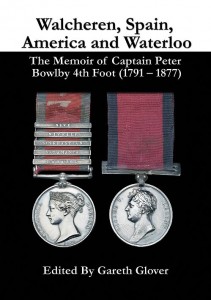Walcheren, Spain, America & Waterloo Memoir of Captain Peter Bowlby 4th Foot 1791-1877

No Longer Avialable in its Original Format
IT IS NOW REPUBLISHED IN NAPOLEONIC ARCHIVE VOLUME 1 FROM KEN TROTMAN PUBLISHING

The 4th (King’s Own) Foot has to date no known memoir of a soldier from its ranks during the Napoleonic wars excepting the biographical and understandably biased book by Archie Hunter based on the few short letters of Lt. Colonel Charles Bevan, which seeks to absolve him, slightly unconvincingly, of any blame for the Almeida debacle. Because of this the service of the 4th generally goes unrecognised. This is grossly unjust, with the regiment being involved at Copenhagen, Walcheren, the Corunna campaign, the Peninsular War from Badajoz to the end of the war, the 1814 campaign in America and the Waterloo Campaign. Luckily, we finally have a fine memoir from the regiment, from a copy which is held at the National Army Museum, reference 2002-02-729 and I am very grateful for their permission and the Right Reverend Ronald Bowlby to transcribe and publish it.
Peter Bowlby was born the third son of the Reverend Thomas Bowlby, Rector of Tudhoe and Perpetual Curate of Pawshaw in Durham and Eleanor Elizabeth Salvin. He appears to have been born in late 1791 but baptised in March 1792, which has caused some confusion with his birth date.
His siblings were:
Mary died 1787
Peter 1786-1787
Elizabeth 1787-1853
Mary Anne 1789-1794
Thomas 1790-1842 became a Captain in the Royal Artillery
Peter 1791-1877
George 1793-1847 Royal Navy
Anthony 1794-1815 Royal Marines, drowned in the Baltic
Edward 1795-1860 Joined the 4th Foot, present at Waterloo became a Reverend
Mary 1796-1854
Joseph 1797-1838 Captain in the 90th Foot
Catherine 1798-1847
Ann 1799-1812
Frances Amelia 1800-1845
Peter joined the 4th (King’s Own) Foot on 7th June 1808, rising to lieutenant on 31st of May 1809 and to Captain on 23rd October 1824. He served at Walcheren, Ceuta, the Peninsular War (seeing action at Badajoz, Salamanca, the retreat from Burgos, Vitoria, San Sebastian, the Nive and Nivelles, it is unclear why he did not receive a bar for Vitoria), Bladensburg and the burning of Washington and New Orleans, before returning to Europe just in time to participate at Waterloo and in the subsequent march to Paris. His memories are sometimes light of detail on specific combats, but his notice of numerous interesting asides throughout the memoir give an excellent idea of life as a junior officer during the Napoleonic wars.
